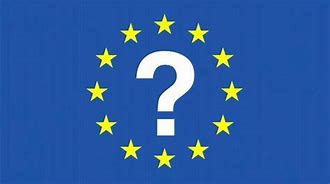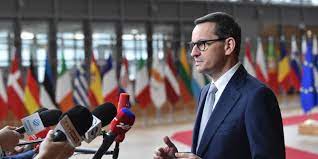SOLIDARITY AGAINST CHERRY PICKING IN THE EU
WHAT ROLE FOR EUROPE IN THE TWENTY FIRST CENTURY?
THE SECURITY CONUNDRUM
INDUSTRIAL POLICY
SOLIDARITY AGAINST CHERRY PICKING IN THE EU
• The initial EU vision emphasized 4 types of solidarity: within country; inter -generational; across Member states; and vis-à-vis poorer countries.
• All 4 have for some time been eroded and are under ever increasing onslaught. The erosion of the first 2 is due primarily to economic policies followed by Member countries, though these have been heavily influenced by the austerity decade of Dijsch (Dijselbloom+ Schaueble)
• The erosion of solidarity across Member states comes from a mix of a reluctance of many countries to join/implement general programs (led forever by the behavior of the UK, sharply accentuated in the past 4 years by attitudes on immigration/intra EU labor movements), to an increasing focus by individual states on what they can get out of the EU – a sort of benefit/cost exercise, where anything that does not offer a significant prospect of net benefit becomes something the country opposes or opts out of
• Even countries apparently most committed to intra EU solidarity have come under fierce criticism due to the perception that they have shaped general EU policies to maximize gains for themselves (Germany and the Euro being the strongest example)
• The final measure of solidarity – economic policies towards poorer countries – has stood up reasonably well, yet has always suffered from major deficiencies. The EU has used the size of its market as bait for trade deals which have reinforced colonial patterns of the international division of labor. The December 2017 EU-Africa summit in Abidjan signals the impending close of this era
• To resurrect solidarity as a core principle requires immense effort at many levels. It means tackling the profound systemic problems which are the main cause of the well documented rise in inequalities throughout Europe (in the December 2017 major publication by the Paris led group, this problem is clearly identified). Not only individual countries, but the EU as a whole, have to take a stance.
• It means the development of a cross European consciousness where people recognize commitments to each other as Europeans, and not only to fellow citizens. Those commitments might be similar to what millions of EU citizens have shown to less fortunate people in other parts of the world.
• And it also means rethinking how solidarity inside and outside EU can grow together. Recent political movements across the continent have shown that many feel that their interests as citizens have been put on the back burner, to the benefit of non- Europeans, rich and poor. The old adage that “charity begins at home” has a new lease of life
WHAT ROLE FOR EUROPE IN THE TWENTY FIRST CENTURY?
• Almost 20% of the century is gone, and it seems as if Europe in general, and the EU in particular, has been relegated in a very wide range of affairs
• The long term relative reduction in Europe’s status is nothing new and no surprise. The advance of far more populated countries and continents implies that Europe will become relatively smaller
• But the real loss is not the long term trends, but the shorter and medium term weaknesses in Europe. The continent has exhibited 3 serious failings
• First, a failure to maintain at home what it has preached abroad. This is sharpest in democracy, governance and the management of public and private interests (the distinguishing public/private partnership is that of corruption). Ethics have all but disappeared
• Second, a failure to develop an economic approach capable of giving Europe a position where it can stand up to very powerful forces on the international scene. Europe is a follower, not a leader
• Third, a failure to grasp the speed, depth and ferocity of change elsewhere in the world. For many years, self –satisfaction has been the hallmark of policies. The European version of universalism was always subject to onslaughts, but they have reached unprecedented levels in the recent period. Europe now has to compete very strongly if it wants to maintain its influence. And, as in any competitive market, it has to be ready to innovate in products and processes, market aggressively, and above all recognize that there is nothing eternal about “the European way”
THE SECURITY CONUNDRUM
• Europe is now firmly in the grip of “the fear factor”. Physical security is no longer taken as given; and economic and social security are perceived as gone.
• The numerous terrorist attacks have revealed in the starkest fashion the appalling problems of organization in the security architecture, within and across countries. Anyone who has a minimum familiarity with the operations of police, military, and intelligence systems is acutely aware that these entities engage in fruitful collaboration only in limited instances, and usually under external pressure. Not all of the reluctance to cooperate is the result of the normal pride of institutions in what they do, and the concomitant desire for turf protection. Each of these crucial entities has its distinct responsibilities, and its specific degree of contact with the general public
• But recent events, above all in a handful of West European countries, have indicated that plenty of opportunities for sound cooperation have been missed – and the public has paid the price
• This state of affairs has been particularly damaging to the EU. The provision of security has always been considered, though not often enough stated, as a key requirement for a functioning Union. Amidst the countless agreements on minutiae of market arrangements, whatever happened to security? The EU has offered the Nero example – fiddling while Rome burns
• The sheer size of the security challenge, underlined by the pace of cyber change, weapons availability, and the media attention, provides the justification for a thorough root and branch examination of how future arrangements might be made
• Should hitherto separate entities, like police and intelligence systems, become more integrated? Should some existing groups in certain countries (such as the Guardia Civil in Spain, or the Carabiniere in Italy, be disbanded or given new mandates)? How much cross border cooperation can/should be institutionalized? Is a real Security Union, and not just an Economic Union, essential for the future? What do these considerations imply for foreign policy?
INDUSTRIAL POLICY
• The defunct “Washington Consensus”, articulated in the triumphalist western years of the 1990s, placed great weight on the so-called “enabling environment” approach to economic policy. Once a certain kind of (mainly) macro- economic policies were established and implemented, all sorts of sectoral policies could be more or less left aside
• For the leading EU countries, the sectoral issue has always been a thorny problem. France, for example, is attached to its “national champions” and the State has been ready to support them (witness the late 2017 Macron decision on St Nazaire). Germany continues to adjust its policies to meet the expressed needs of its auto firms (something which, for instance, raises serious questions about the credibility of norms in this sector, as well as the extent of Germany’s real commitment to reduction of greenhouse gases). Cross country collaboration to build “European champions”, such as Airbus, has been tried
• Yet, in the opposite direction, the EU stance on competition has not made it easy either for States or regions to encourage growth oriented activities or mergers. This is especially difficult in the telecommunications field, where the US has about 8 major players while the EU has close to 500
• Apart from the large industrial entities, where overall policies have been contradictory (meaning allowing effective cartelization, which is negative, and hindering consolidation, which in several cases would be positive), Europe has also had grave difficulties in encouraging start-ups, taking forward innovation, and supporting SMEs.
• Some of the problems for start-ups and carrying forward those who have begun well, can be traced to inadequacies in financial markets. Europe is a risk averse place – and that shows in the behavior of public and private financial institutions. With SMEs, which in any case offer the largest private sector jobs market in most EU countries, the balance of policies affecting their behavior is mostly none too positive.
• If the EU is to carry weight in future oriented industrial sectors, a rethink of how macro and sectoral policies is urgently needed. Isn’t it time, for example, that all the “Industry 4.0” efforts in various countries started to assess collaboration options?





